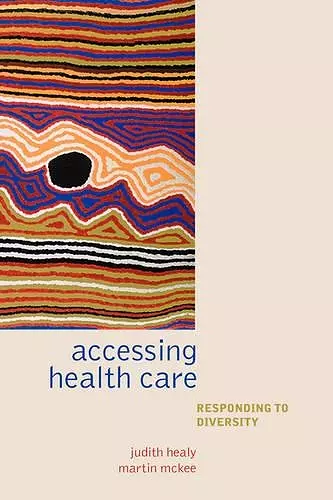Accessing Healthcare
Responding to diversity
Martin McKee editor Judith Healy editor
Format:Hardback
Publisher:Oxford University Press
Published:8th Jan '04
Currently unavailable, and unfortunately no date known when it will be back

Health care systems in developed countries must respond to increasingly diverse populations given greater population movements as a result of globalization. We all share a common humanity yet we each have different health care needs, depending on whether we are young or old, men or women, rich or poor, disabled or able-bodied, from different ethnic and indigenous groups, or citizens or asylum-seekers. Our membership of these societal groups shapes to some extent our health needs and our use of health services. But policy-makers and professionals often seem blind to this diversity. Some groups make special claims upon the state and have different expectations regarding health care. What are the barriers to people receiving equitable health care? Should mainstream services be made more responsive to the needs of different people, or is it necessary to set up alternative health care services? The chapters in this book discuss countries and population groups that illustrate different responses to claimant groups and different ways of delivering health services. For the first time this book brings draws together examples of how to deal with diversity from health systems across the industrialized world. It considers population groups within countries and takes a broad approach, studying inherent population diversity (age, sex), citizen issues (migrants, asylum seekers) and ethnic and indigenous groups (multiculturalism in the UK, Roma in Europe, New Zealand Maori, Australian Aborigines). It identifies barriers to accessing health care services by diverse populations and cultural groups within different countries and considers the advantages and disadvantages of different delivery models for different population groups. This book provides an unparalleled breadth of perspectives from which to draw conclusions about how to meet the needs of societies characterised by diversity.
Because of the important messages in this book everyone in the health service, including clinicians, should read it. * Journal of the Royal College of Physicians of Edinburgh, 34 *
. . . provides a welcome compilation of evidence on the difficulties faced by various vulnerable groups in accessing the health-care services available in their respective communities. Although the book brings together a large number of disparate case studies, their overarching theme is constant: ensuring access to adequate, appropriate, and effective care and improving the health of specific population groups that historically have been marginalized. The examples are drawn from a selection of developed countries in North America, Australasia, and Europe. The editors are to be commended on producing a book worth reading in its entirety, "with diligence and attention." * Bulletin of the World Health Organization, 82, (1) *
ISBN: 9780198516187
Dimensions: 240mm x 161mm x 25mm
Weight: 695g
400 pages